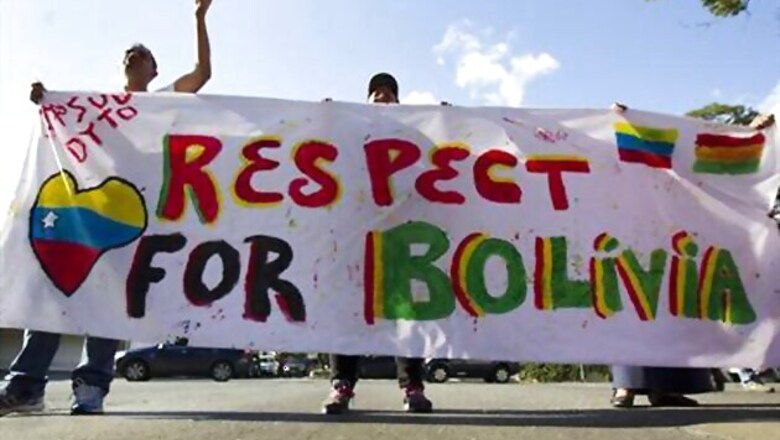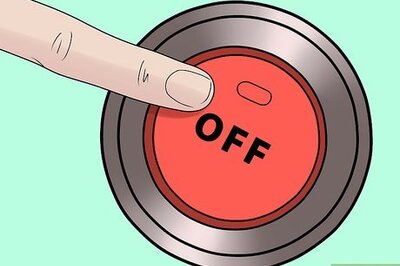
views
South America's most outspoken leftist leaders demanded an explanation and public apology from four European countries on Thursday after Bolivian President Evo Morales' plane was diverted this week on suspicions that fugitive U.S. spy agency contractor Edward Snowden was aboard.
At a summit in Cochabamba, Bolivia - where Morales began his political career as a leader of coca leaf farmers - five regional leaders joined him in denouncing his "virtual kidnapping" and the U.S. pressure they believe spurred it behind the scenes.
At the end of the summit - which included the leaders of Argentina, Uruguay, Ecuador, Surinam and Venezuela - a statement was issued demanding answers from France, Portugal, Italy and Spain. The United States was not mentioned in the statement.
"Europe broke all the rules of the game," Venezuelan President Nicolas Maduro said shortly after arriving at the Cochabamba airport. "We're here to tell President Evo Morales that he can count on us. Whoever picks a fight with Bolivia, picks a fight with Venezuela."
Maduro said an unnamed European government minister had told Venezuela that the CIA, the U.S. spy agency, was behind the incident.
"We are not colonies any more," Uruguayan President Jose Mujica said. "We deserve respect, and when one of our governments is insulted we feel the insult throughout Latin America."
Morales welcomed the show of support. He said regional unity was needed "to defeat North American imperialism" and raised the possibility of closing the U.S. embassy in La Paz.
"My hand would not shake if it came to closing the embassy," he said. "Without the United States we are better off politically and democratically."
The U.S. embassy remains open in Bolivia although the two countries have not had full diplomatic relations in years.
Despite the rhetoric, no Latin American country has offered asylum yet to Snowden, who is wanted by Washington for disclosure of intelligence secrets.
Russia is growing impatient over Snowden's stay in a Moscow airport and officials have urged him to leave.
Bolivia said Morales was returning from Moscow on Tuesday when France and Portugal - later joined by Italy and Spain - banned his plane from entering their airspace, forcing it to land in Vienna. Austrian officials said they inspected the aircraft there, but Bolivia's defense minister denied this.
REGIONAL SPLIT
Noticeably absent from the Cochabamba gathering was the president of regional heavyweight Brazil, Dilma Rousseff, who sent her international affairs adviser and a deputy foreign minister to the meeting.
The presidents and foreign ministers of Chile, Peru and Colombia, which have good relations with the United States, also stayed away. In a written statement, Colombia's foreign ministry called on Bolivia and the European governments involved to find a diplomatic solution.
Bolivia and Venezuela were also irked at receiving provisional arrest requests for Snowden from Washington, a move Bolivia called "illegal and unfounded".
U.S. State Department spokesman Jen Psaki, said: "We've broadly asked for Mr. Snowden to be returned from any country where he may be, where he may land, where he may transit."
To allay the anger of allies over reported U.S. spying in Europe that came to light in the Snowden scandal, U.S. President Barack Obama has agreed to talks with the European Union, and to bilateral talks with Germany after speaking on Wednesday night with Chancellor Angela Merkel.
"I made clear spying on institutions within the European Union is not how we would expect those we consider friends to treat us," Merkel said.
HERO'S WELCOME
Morales arrived home to a hero's welcome late on Wednesday with cheering, fist-pumping crowds greeting him at the airport.
Bolivia is among more than a dozen countries where Snowden has sought asylum, and Morales has said he would consider granting the American refuge. But he said earlier this week no request had been made.
The 30-year-old Snowden, who worked as a contractor for the National Security Agency in Hawaii, has been trying since June 23 to find a country that will offer him refuge from prosecution in the United States on espionage charges.
But his options have narrowed since he arrived in Moscow from Hong Kong with no valid travel documents after the United States revoked his passport.




















Comments
0 comment